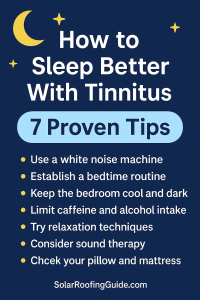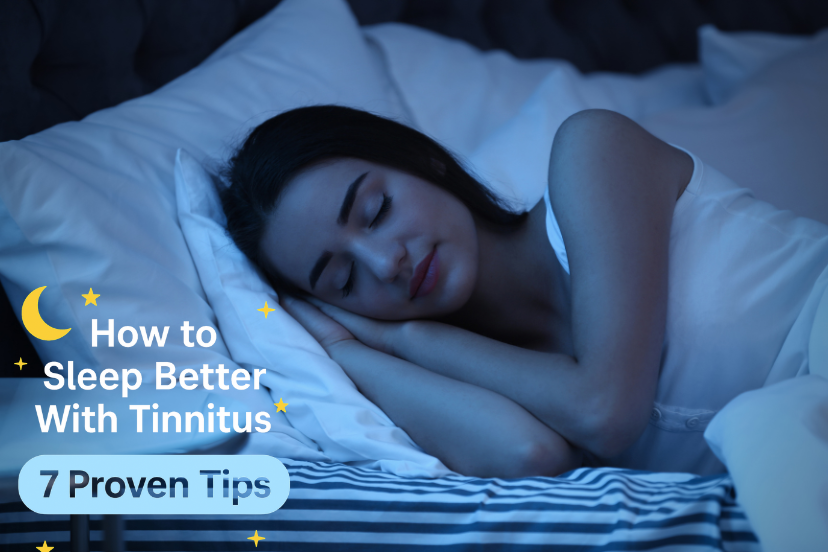How to Sleep Better With Tinnitus: 7 Proven Tips for a Quieter Night
🔊 The Challenge of Sleeping With Tinnitus
It’s late at night. The world around you is quiet — but inside your head, it’s anything but.
That ringing, buzzing, hissing, or whooshing sound in your ears gets louder the moment you lie down, making sleep feel impossible.
If this sounds familiar, you’re not alone. Millions of Americans experience tinnitus, and many say bedtime is the hardest part of the day. But here’s the good news — while tinnitus can’t always be cured, you can train your brain and body to relax, rest, and get the sleep you desperately need.
In this guide, we’ll explore 7 proven ways to sleep better with tinnitus, including practical relaxation methods, sound therapy, and sleep hygiene tips backed by science.
Quick Answer
Sleeping better with tinnitus usually involves reducing how noticeable the ringing feels at night and calming the nervous system before bed. Many people benefit from gentle background sounds (such as white noise, a fan, or nature sounds), a consistent sleep schedule, and stress-reduction habits such as slow breathing or relaxation exercises. If tinnitus is severely disrupting sleep, a healthcare provider or hearing specialist can suggest personalized strategies.
🌿 Understanding Why Tinnitus Feels Worse at Night
Before diving into solutions, it helps to know why tinnitus gets louder when you try to sleep.
-
Silence amplifies awareness. When everything else is quiet, the ringing becomes the loudest sound your brain hears.
-
Stress and fatigue heighten perception. The more anxious and exhausted you feel, the stronger tinnitus seems.
-
Poor circulation or jaw tension. These physical factors can increase inner-ear pressure and nerve activity.
-
Blue light and overstimulation. Scrolling your phone before bed triggers alertness and makes it harder to fall asleep.
👉 The key to relief is creating a relaxing, sound-rich bedtime routine that retrains your brain to ignore tinnitus signals while promoting deep rest.
💤 1. Use Sound Therapy to Mask the Ringing
Silence is tinnitus’s best friend — so your first strategy is to replace silence with soothing sound.
🎵 What Works Best
-
White noise machines – Constant neutral sounds like fan noise or rainfall help “mask” tinnitus.
-
Nature sounds – Ocean waves, forest rain, or wind can be calming and rhythmic.
-
Specialized tinnitus apps – U.S.-based options like ReSound Relief, myNoise, and Calm let you customize your soundscape.
💡 Pro Tip
Set the volume just below your tinnitus level. The goal isn’t to drown it out — it’s to blend it into the background so your brain stops fixating on it.
🌙 2. Practice Relaxation Techniques Before Bed
Tinnitus and stress are deeply connected. When you’re anxious, your brain’s “fight or flight” system ramps up, making the ringing louder and more noticeable.
🧘 Try This 5-Minute Nighttime Routine
-
Dim the lights and sit comfortably.
-
Inhale slowly for 4 seconds.
-
Hold your breath for 2 seconds.
-
Exhale gently for 6 seconds.
-
Repeat for 10–15 breaths.
Pair this with progressive muscle relaxation — tense and release your muscles from head to toe. You’ll feel your body loosen and your focus shift away from tinnitus.
Other helpful methods: guided meditation, aromatherapy (lavender oil), or mindfulness apps like Insight Timer.
🌡️ 3. Keep Your Bedroom Cool, Dark, and Tinnitus-Friendly
A good sleep environment makes all the difference when learning to sleep with tinnitus.
🛏️ Optimize Your Sleep Setup
-
Temperature: Keep your bedroom between 60–67°F (15–19°C) — cool air promotes deeper sleep.
-
Lighting: Use blackout curtains or a sleep mask to block unwanted light.
-
Noise balance: Avoid total silence; keep a subtle sound running all night.
-
Comfort: Invest in a supportive pillow — neck or jaw strain can worsen tinnitus in some people.
💤 Bonus Tip: Use a small fan or humidifier to add background noise and airflow.
📱 4. Turn Off Screens an Hour Before Bed
Blue light from phones, TVs, and computers suppresses melatonin — your natural sleep hormone — and overstimulates the brain.
🚫 The “Digital Detox” Rule
-
Turn off screens at least 60 minutes before bed.
-
If you must use your phone, activate Night Shift or Blue Light Filter mode.
-
Read a printed book, journal, or listen to calming audio instead.
You’ll fall asleep faster, and your tinnitus will seem less intrusive once your mind winds down naturally.
🧴 5. Avoid Sleep Disruptors: Caffeine, Alcohol, and Heavy Meals
Certain lifestyle choices can spike tinnitus and disrupt sleep patterns.
⚠️ Limit or Avoid:
-
Caffeine (after noon): Increases alertness and nervous system activity.
-
Alcohol: Interferes with REM sleep and can cause dehydration.
-
Salty or heavy meals: May increase inner-ear pressure or blood flow changes that intensify tinnitus.
Instead, enjoy a light evening snack that promotes sleep:
-
Banana with almond butter 🍌
-
Oatmeal with honey 🍯
-
Herbal teas like chamomile or valerian root ☕
🕯️ 6. Try Melatonin or Natural Sleep Aids
Melatonin — a natural hormone that regulates your sleep-wake cycle — has been shown to help some tinnitus sufferers fall asleep faster and reduce perceived ringing.
🌿 Helpful Natural Options
-
Melatonin (0.5–3 mg) – Improves sleep quality without morning grogginess.
-
Magnesium – Calms nerves and muscles; available in glycinate or citrate form.
-
L-theanine – An amino acid found in green tea that promotes relaxation.
Always consult your doctor before starting supplements, especially if you take medication.
🩺 U.S. Note: Melatonin is available over-the-counter in the U.S., but dosage consistency varies by brand — choose reputable labels like Natrol or Nature Made.
🌤️ 7. Develop a Consistent Sleep Routine
The body thrives on rhythm — and so does the brain. Establishing a bedtime routine trains your mind to expect rest and helps manage tinnitus long-term.
⏰ Create a “Tinnitus-Friendly” Schedule
-
Go to bed and wake up at the same time daily (even weekends).
-
Spend 10–15 minutes winding down with relaxing rituals — deep breathing, journaling, or gentle stretching.
-
Keep your phone out of reach or use airplane mode overnight.
-
Avoid checking the time if you wake up — it increases anxiety and awareness of ringing.
🧩 Pro Tip: Some people use “habit stacking” — linking new habits (like sound therapy) with existing ones (like brushing your teeth) — to make them automatic.
🩺 When to See a Doctor
While lifestyle changes can help you sleep better with tinnitus, it’s important to consult a healthcare professional if you experience:
-
Sudden tinnitus in one ear only
-
Hearing loss or dizziness
-
Pain, drainage, or ear fullness
-
Pulsatile tinnitus (ringing in sync with your heartbeat)
-
Severe anxiety, depression, or insomnia
An ENT (Ear, Nose & Throat) specialist or audiologist can evaluate causes such as earwax buildup, infection, or hearing damage — and recommend medical treatments like tinnitus retraining therapy (TRT) or cognitive behavioral therapy (CBT).
❓ FAQs Sleep With Tinnitus
1. Why does tinnitus get louder at night?
Because external sounds are minimal, your brain amplifies internal ones. Using sound therapy or soft background noise can help mask the ringing.
2. Can I use headphones to sleep with tinnitus?
It’s best to avoid sleeping with headphones. Instead, use a bedside sound machine or speaker that plays continuous, low-volume noise safely.
3. What is the best sleeping position for tinnitus?
Try sleeping on your back or non-affected side to reduce pressure and improve circulation in your ears.
4. Can anxiety make tinnitus worse at night?
Yes. Anxiety raises cortisol levels and increases tinnitus perception. Relaxation exercises before bed can lower stress and improve rest.
5. Are there any medications that help with tinnitus and sleep problems?
Doctors may prescribe short-term sleep aids or anxiety medications, but natural methods like melatonin or sound therapy are preferred first.
6. Is it safe to use white noise all night long?
Yes — as long as the volume is moderate (below 60 decibels). It helps your brain habituate and reduces tinnitus awareness.
🌅 Conclusion: Rest Is Possible — Even With Ringing Ears
Tinnitus may not disappear overnight, but restful sleep is within your reach.
By creating a calming bedtime routine, using gentle background noise, and managing stress, you can train your brain to tune out the ringing and embrace true relaxation.
Start tonight — pick one or two of these proven sleep with tinnitus strategies, stay consistent for a few weeks, and notice how your nights gradually become quieter and more restorative.
Your journey to peaceful sleep starts with patience, consistency, and a calm mind — even when the noise doesn’t stop, your rest can.
⚠️ Disclaimer
This article is for informational purposes only and is not a substitute for professional medical advice, diagnosis, or treatment. Always seek guidance from a qualified healthcare provider or audiologist before beginning new therapies or supplements.

- Ear Ringing After Loud Noise Exposure
- How to Stop High-Pitched Ringing in Ears
- Neck Exercises for Tinnitus Relief






